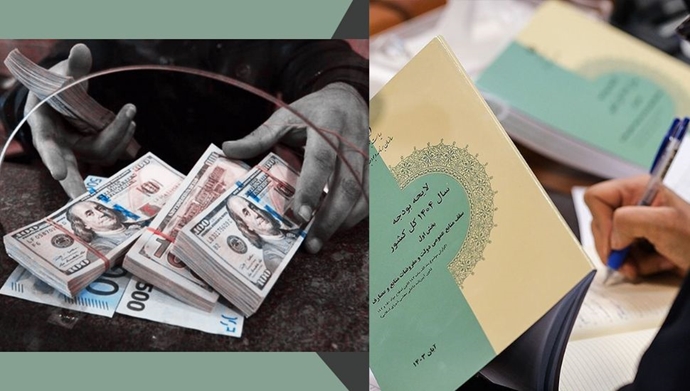After several days of internal strife among factions of Iran’s regime, the general outline of next year’s budget was approved by the Majlis (parliament). Out of approximately 250 representatives present at the session, close to 100, or about two-fifths of attendees, voted against it.
Rising Prices and Inflation for the Vulnerable
One of the immediate effects of the approved budget will be increased inflation and prices, particularly affecting the vulnerable sectors of society. The allocated foreign currency for essential goods—critical for struggling citizens—has been reduced.
On October 30, Mehr News Agency reported, “The allocation for essential goods this year was $15 billion, which the government intends to cut by $3 billion for next year. As a result, several essential goods will either be removed from the preferred foreign exchange list or receive less funding.”
Tripling the War Budget
While resources are being taken and as most Iranians suffer under skyrocketing prices, the allocated budget for oppression and terrorism has, as usual, increased by 200 percent—three times what it was last year!
Government’s Deceptive Announcement
The government spokesperson, Fatemeh Mohajerani announced this budget increase after hearing a song about Iran. She firmly confirmed the budget increase for defense, yet when it came to other topics like education, health care, and medicine, she offered no promises, responding only with uncertainties.
Evasion of Education Budget
Regarding the future education budget, Mohajerani deflected criticism and said, “We are in the first year of the seventh program; the entire plan is not meant to be implemented in a single year. The program has phases, and we must progress step-by-step” (Source: the state-run Tabnak newspaper, October 30).
Ambiguity Around Budget Deficit
Despite claims of “transparency” in budget preparation and approval by Pezeshkian and Mohammad Bagher Ghalibaf, the Speaker of Majlis (Parliament), the regime’s inherently exploitative nature prevents it from being honest with Iranians. Regarding the various obfuscations within this budget, MP Nasrollah Pejmanfar admitted, “There is essentially no transparency in this budget bill.”
Huge Deficit Estimates
One of the largest ambiguities lies in the budget deficit, which has drawn numerous estimates recently:
– Minister of Economic Affairs and Finance Abdolnaser Hemmati estimated it at “8.5 quadrillion rials,” which Mohammad Bagher Nobakht, head of the Program and Budget Organization, confirmed.
– A government-affiliated website estimated it at “9.5 quadrillion rials” (Source: Asr-e-Iran news website, October 22).
– Vice President Mohammad Reza Aref projected it to be “10 quadrillion rials” (Source: EcoBourse news website , September 16).
– The IRGC-affiliated Fars News Agency declared on October 31, “With a 42 percent increase in revenues and a 55 percent increase in spending allocations, the gap between income and expenditures for 2025 has widened compared to last year, reaching 18.05 quadrillion rials.”
– Jahan-e Sanat news website claimed that “the budget deficit is over 40 percent of the total budget.”
A Budget Built on Promises
Even more significant than the budget deficit and its ambiguities are the sources of budget funding. Analyzing the regime’s mechanisms to secure this budget, it’s apparent that all its sources are based on speculative promises.
Funding Built on Loans and Tax Hikes
Around 5.41 quadrillion rials are to be borrowed from the National Development Fund.
Another 7 quadrillion rials are expected from government bond sales, which are 4.5 quadrillion rials more than the current year.
A proposed customs revenue increase of 85 percent, reaching 2.64 quadrillion rials, raises the question, “Will imports be higher next year than this year?” (Source: The state-run Etemad newspaper, October 23).
Another funding source is the currency exchange rate increase, which brings additional uncertainties.
Tax hikes are another significant funding pillar, directly impacting citizens and officials state, “Government tax revenues in the 2025 budget have increased by 39 percent compared to 2024, reaching 1.7 quadrillion rials… this is directly taken from people’s pockets, though in other ways” (Source: IRGC-run Javan newspaper, October 22).
Price Hikes and Playing with Fire
The most critical plan Pezeshkian envisions to patch this budget includes the continued unchecked printing of hundreds of trillions in unbacked currency, which will put the greatest strain on citizens’ wallets. Additionally, he plans to increase prices on energy sources, including gasoline and electricity.
The Regime’s Priorities
By reducing currency allocations for essential goods and irresponsibly increasing the budgets for oppression and terrorism, the regime clearly prioritizes preserving power over meeting citizens’ basic needs. However, with this budget, the regime should expect increased public discontent and intensifying protests.



